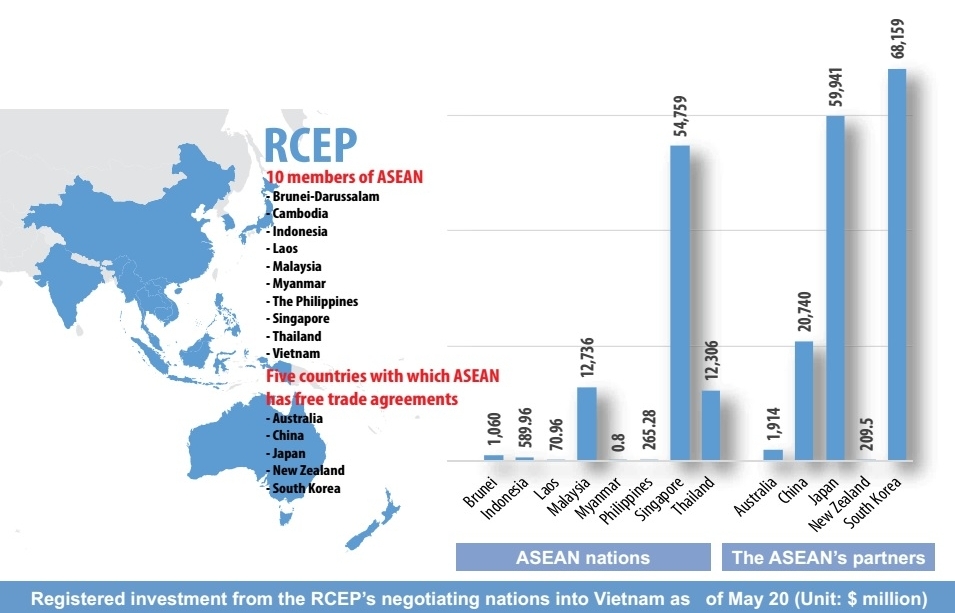spoke to VNA about the Regional Comprehensive Economic Partnership (RCEP). The interview has been lightly edited for clarity.
 |
|
Iman Pambagyo, Chief of the RCEP Trade Negotiating Committee of ASEAN and Director General of International Trade Negotiations at the Trade Ministry of the Republic of Indonesia.
|
Please tell us the difficulties and shortcomings of the Regional Comprehensive Economic Partnership (RCEP) negotiation process. Can this agreement be signed on schedule in 2020?
The negotiation was launched in 2013. And it includes 16 countries altogether. When compared to the TPP now the CPTPP, you see that in the RCEP, we have almost half the population of the world, and around 38 per cent of the world's GDP.
We have not only advanced economies but also developing economies. So the challenge is how to find a balance of interests among countries. So we managed to come to this point where only a few, very few, issues need to be settled for this month in July, and I'm quite confident that we can sign this agreement in November and become one of Viet Nam's major deliverables this year.
What would the agreement mean for countries in the context of the global economic downturn caused by the COVID-19 pandemic?
If we could sign this agreement this November, it will send a clear and very strong message. I think despite the fact that the multilateral trading system is being questioned by many countries, many governments and communities, we mean to seal the deal and to confirm our intention to expand and deepen our economic ties.
It might enter into force in two or three years after the signing. But at this point in time, particularly in the middle of COVID-19, it will send a very strong political signal.
What does Indonesia expect from the RCEP?
Well, again, Indonesia would like to put ourselves in a position deeper into the regional supply chains. And we see that the RCEP will help Indonesia to get this springboard, to be more productive, to be more strategic in terms of the global supply chain. Now we try to come up with the RCEP where we will better facilitate the movement of goods, of people and capital in Asia. I think and I believe Indonesia will benefit from the RCEP as much as other countries. It depends on our domestic preparation, our own capacities to capitalise on the RCEP agreement.
How will RCEP affect trade between Indonesia and Viet Nam?
It is a very interesting question on how Indonesia and Viet Nam could mutually benefit from the RCEP. I believe that there is much room between the two countries to explore and to benefit. Of course, we have this ASEAN framework. But moving forward, I think Indonesia and Viet Nam should focus on our own factors of endowment and focus on what products are best that we can purchase. Again, we are talking about supply chains, value chains between Indonesia and Viet Nam.
I think moving forward, digital economy will be one area where Indonesia and Viet Nam can partner to develop and to capture part of markets in RCEP in particular. Another area could be manufacturing, but specifically in the area of automotive sector. Perhaps Indonesia and Viet Nam could work together on so-called ASEAN cars, in a sense, but there are more potential areas actually. Indonesia has a diverse agricultural production, while Viet Nam has advantages in the manufacturing sector in food. So we can partner in those areas.
How do you evaluate the role of Viet Nam in the negotiation process, as well as promoting this agreement?
We appreciate the chairmanship of Viet Nam this year to lead ASEAN in this very challenging time of the pandemic.
In terms of assessing the completion of the RCEP agreement, perhaps Viet Nam could send a message to the rest of the world, and particularly in the RCEP region, by reiterating the point that RCEP is an ASEAN-led negotiation and ASEAN-led project. Because outside, many observers, politicians, economists and also the public in general, see the RCEP as a China-led FTA. It is not true.
The fact that China is one of the largest economies, but in terms of the RCEP negotiation, it is not a China-led initiative. It is more ASEAN-led initiative. So I really hope that Viet Nam could convey this message to the public: this is an ASEAN-led project. — VNS

RCEP benefits on horizon for ASEAN
With the Regional Comprehensive Economic Partnership scheduled to be signed this November, doors will soon open to attract more investment and swell Vietnam’s trade with international partners.

RCEP members determined to sign deal in November
Ministers from countries participating in negotiations over the Regional Comprehensive Economic Partnership (RCEP) gathered at the 10th intersessional meeting held in the form of a video conference on June 23